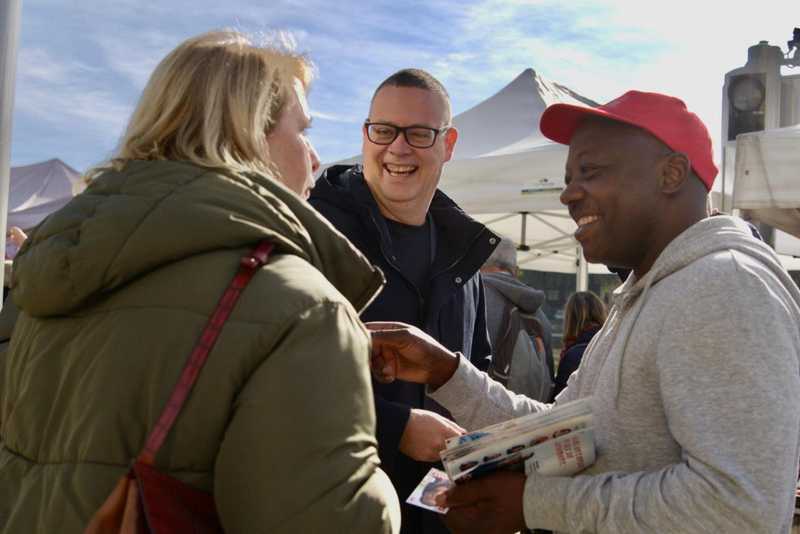
A few metres from the North Sea, in the Flemish town of Ostend, the Belgian Workers' Party (PTB) celebrated its political comeback last September with a major Manifiesta attended by 15,000 people. The programme included a number of international guests, including British MP Jeremy Corbyn, American trade unionist Shawn Fain and French journalist Serge Halimi, as well as political, cultural and sports workshops for party supporters. Throughout all the debates, there was one common thread: reclaiming the heritage of Marxism and working to rebuild it.
In this way, the PTB aims to be more offensive than the French Communist Party (PCF), which has faltered and received weak electoral results. Time after time, the radical left party has demonstrated its growing capacity to organise the working class in various bodies, on the model of the mass parties of the 20th century. Beyond electoral campaigns, which are seen as just another way of politicising people, the party's president, Raoul Hedebouw, gave a clear reminder of the PTB's objectives: to “awaken class consciousness” and to enable “the people to structure themselves, against atomisation” in order to “materialise counter-power”.
A Party That Cannot Be Ignored
While the PTB has become a major party in Belgian politics, there is still much to be done. In the elections on 9 June — when Belgians elected their national, regional and European MPs — the PTB made new progress. It sent a second member to the European Parliament, went from 12 to 15 seats nationally and considerably improved its representation in the Brussels region and in Flanders, going from 11 to 16 and from 4 to 9 elected members respectively. For the first time, the party was even consulted by the King of Belgium with a view to joining the government, although this was quickly ruled out by all the other parties.
As such, the PTB had good reason to celebrate this successful campaign. Its grassroots mobilisation in Flanders undoubtedly helped to divert part of the working class from voting for the far right, which had been predicted as the winner in this part of the country for several months. While the Vlaams Belang (Flemish pro-independence far-right) has long been established, the PTB (known as the PVDA in Flanders) has succeeded, at the cost of a great deal of investment by and into its militants, in embodying an alternative for voters angry at the status quo. By placing second in Antwerp, the major port city in the north, the party even surprised in a city often described as a bastion of the right.
The only fly in the ointment was a slight setback in Wallonia, where the left as a whole lost votes as a consequence of a successful campaign led by the Mouvement Réformateur (right) and its ambitious president Georges-Louis Bouchez. Admittedly, the PTB had focused particularly on Flanders this year in order to rebalance its forces across the country, which was essential for it as the only party defending Belgian unity. However, major mobilisation efforts will be needed to regain a foothold in Wallonia, which, although it does not have a far-right party, has been seduced by the rhetoric of an increasingly conservative MR that has skilfully reappropriated the ‘value of work’ by pitting workers against the unemployed. According to the Right, the Socialist Party is deliberately keeping these people on welfare, thereby securing an electoral clientele.
The Social War ‘On Pause’
While the PTB's electoral performance has been encouraging, the party refuses to rest on its laurels and play politics according to the polls, as Raoul Hedebouw told us in an interview with LVSL. At Manifiesta, the party's various leaders strongly emphasised the need to attack the rhetoric that seeks to divide the people, by pitting them against foreigners or the supposedly ‘assisted’. This is all the more necessary given that the future coalition government, known as ‘Arizona’ (for the combination of coulors similar to the flag of the US state), is planning an extremely violent anti-social programme: raising VAT on essential goods from 6% to 9%, getting rid of a law that indexes wages to inflation, easing regulations for work on Sundays and public holidays, ending the 38-hour week, attacking the rights of union representatives, cutting pensions, etc.
This programme of social war envisaged by a broad alliance, comprising the Flemish Socialists of Vooruit, the French-speaking right-wing MR, the N-VA (Flemish right), the CD&V (Christian conservatives) and Les Engagés (centre), has admittedly been muted of late. For one simple reason, according to Raoul Hedebouw: “They pressed the pause button until the elections on 13 October. And they thought that people were too stupid to understand what they were doing.” That day, Belgians voted to renew their local councils for the next six years. Fearing defeat at the ballot box, the parties in the Arizona alliance preferred to wait until after the vote before launching their offensive.
‘Municipal Communism’ As A Source Of Inspiration
Victories are possible, but to what end? One of the PTB's priorities is to halt the surge in housing prices by imposing a simple rule on developers: one-third social housing, one-third affordable housing, and one-third at market prices. When it comes to transport, the party certainly promotes the development of public transport, but is firmly opposed to anti-social policies against the car where no alternative exists. This is particularly aimed at workers who are dependent on the car because of their working hours or the distance they have to travel to work as a result of property speculation. The party also wants to rebalance local taxation, by taxing large companies more to lower taxes on local businesses, as has been done in Zelzate and Borgerhout, two small Flemish municipalities where the PVDA is part of the outgoing majority. Finally, in a more classic left-wing fashion, he promises major investment in public services such as childcare centres and community policing, as well as in the non-profit sector.
Speaking to Manifiesta, Raoul Hedebouw describes this programme as a first step towards the “municipal communism” that he cites as a source of inspiration. This tradition of social progress on a municipal scale has a long history, through the construction of public housing, the development of a range of cultural activities and holiday camps for the poorest, and social assistance schemes such as the CCAS, mutual aid societies, family planning centres and food cooperatives. Throughout Western Europe, communist and workers’ parties have long succeeded in turning their strongholds into examples. As well as immediately improving living conditions for local residents, the aim was also to show what future communist life could be like. This is a legacy that has largely been lost over the last half-century, but is still alive and well in Austria, where the KPÖ communist party runs Graz (the country's second-largest city), and in Chile, where the communist Daniel Jadue leads avant-garde policies in a Santiago suburb.
In comparison, the PTB's programme seems more reformist, which is explained by the need to govern with more moderate allies, namely the Socialist Party and Ecolos, or even Vooruit. While these parties have always rejected the PTB's offers to form progressive coalitions, as David Pestieau, the party's political secretary, points out, the situation may be changing: these parties are losing ground, excluded from national negotiations and competing with the PTB on their left. Like Pedro Sanchez's PSOE, they could therefore abandon their strategy of avoidance and try to reach majorities with the PTB in order to rebuild their political credibility. For the Marxist party, such a situation would be double-edged: on the one hand, it could break out of its political isolation and dispel the argument that it is still an opposition party, incapable of governing. On the other side, it could be held accountable for bad decisions and lose some of the credibility it has won over the last fifteen years.
Organising Workers: The PTB's Watchword
To avoid this scenario, the party will have to make skilful use of its blocking capabilities in those areas where its votes will be decisive in obtaining a majority, and also rely on its presence outside the institutions. This last point is a major difference with other radical left parties, such as Podemos, which has shown itself to be subtle in terms of parliamentary tactics vis-à-vis the PSOE, but has abandoned the terrain of trade unions and social movements. On the other hand, the PTB continues to invest in company sections, the ‘first bastion’ of workers' organisation, and gives concrete support to workers in decisive battles against their management. The most recent mobilisation was in support of Audi workers in Brussels (VW Forest), threatened by the closure of their plant, which is the leading production site for electric vehicles in Belgium and employs nearly 3,000 people. Invited by the chairman of the Economic Affairs Committee, Roberto d'Amico, a former FGTB trade unionist and current PTB MP, to explain its position before the Belgian Parliament, Audi's management did not respond, but was nevertheless forced to open the doors of its plant to members of parliament from all parties in order to clarify its intentions.
This was a first victory in the face of the closed-door meeting which was initially intended to settle the fate of the Audi workers and confirm the unviability of the various takeover plans. Robin Tonniau, PTB federal deputy, explains: “Audi has made strategic mistakes that affect thousands of workers, and we should take their word for it that none of the 24 scenarios studied is profitable? We are demanding total transparency from Audi, as the unions are demanding. (...) How can it be that there is no financial interest, according to management, in maintaining a car manufacturing business?” The question is all the more poignant because it was asked by a former worker at the site. Robin Tonniau, who was elected to the Flemish Parliament in 2019 and to the House in 2024, spent 16 years working in the automotive industry. It's a trajectory in line with the one the PTB is trying to promote in order to transform elected positions into positions of tribune, where the echo of a genuine ‘popular spokesperson’ can be heard,capable of addressing all the country's workers. According to some of the PTB activists we met at Manifiesta, it is by reminding people that sectoral mobilisations are also national causes that PTB MPs manage to “awaken class consciousness”.
If there is one watchword that explains the PTB's progress over the last few years, it is certainly that of organisation, which goes far beyond campaigning in election periods. When we normalise “gaseous movements”, we justify “an organisational delay”, Raoul Hedebouw argued in a debate with Serge Halimi, former director of Le Monde Diplomatique, on the subject of the rise of the far right. In his view, nationalist parties are taking advantage of this lag, rebuilding an ‘us’ in place of the ‘we’ historically built up by the workers' movement. To reverse this trend, the PTB President believes that we need to return to a workers' left, not a left of values. Admittedly, the opposition is not binary, but it must make certain analyses: do we consider far-right voters to be lost to the cause or, on the contrary, capable of emancipating themselves from the ‘political and ideological chaos’ that the ruling class deliberately maintains? In Belgium, there is no debate about the answer: all voters are first and foremost workers and, as such, are not beyond redemption. This contrasts with the prevarication of the left-wing forces across the border, who are still wondering how — and why — to win back the working classes.
This is an abridged version of the original article published by LVSL on 13 October.
Photo: LVSL






